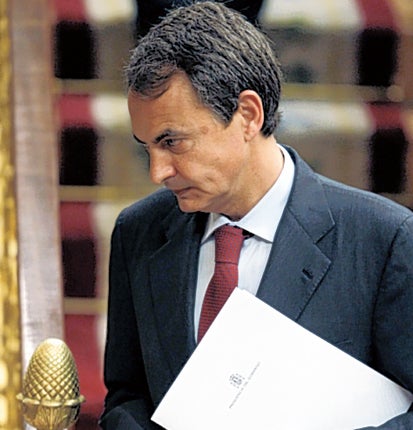Spain faces unrest as new austerity plan is announced

Under pressure from Brussels and the White House, Spanish Prime Minister José Luis Rodriguez Zapatero made an about-turn yesterday, announcing a barrage of painful measures to curb his country's ballooning deficit.
The new austerity package – aimed at averting a bigger version of the Greek crisis, but likely to anger the Spanish unions – includes a 5 per cent pay cut for Spain's 2.5 million public sector workers this year, scrapping the €2,500 (£2,100) "baby cheque" for new mothers and a €6bn cut in public investment.
Spaniards surviving on minimum pensions kissed goodbye to promised cost-of-living increases yesterday, while unpopular cuts to state medical expenditure, payments to people caring for elderly parents and international development projects were also announced. Mr Zapatero said government ministers would take a 15 per cent pay cut whilst also hinting that he would raise taxes for the wealthy.
The measures, he said, would save €15bn and reduce the deficit – which last year shot up to 11.2 per cent of GDP – to 9.3 per cent this year, 6 per cent next year and 3 per cent by 2013. Data published yesterday showed that the Spanish economy had grown for the first time in nearly two years in the first quarter of 2010, but only by a measly 0.1 per cent.
"We are going to ask for a greater effort by everyone – by Spanish society, the citizens, and also by the government – and we will ensure that it is fair and justified," Mr Zapatero said. "We need to make a singular, exceptional and extraordinary effort to cut our public deficit, and we must do so now that the economy is beginning to recover."
In an attempt to allay the fears of unions and his home constituency, the Socialist Prime Minister stressed that despite the new austerity measures, "the pillars of the welfare state will remain untouched".
Until now, Mr Zapatero has managed to avoid the type of unrest that has brought thousands on to the streets of Athens, despite a unemployment rate of 20 per cent and an earlier round of austerity cuts. This was in part because he managed to preserve social benefits and protections in the face of repeated calls by economists and business leaders for labour reform.
Following yesterday's announcement, however, union leaders issued veiled threats of taking to the streets. "The behaviour of the trade unions has been and is impeccable during these times of crisis and will continue to be so, but [yesterday's] announcement is a turning point," Ignacio Fernandez Toxo, president of one of Spain's largest trade unions, told reporters. He said he expected citizen reaction to be "massive". The union leader warned that cuts in salaries and pensions would be counter-productive to Mr Zapatero's objectives, because they would dampen consumption and cause even more unemployment.
But Brussels welcomed the Prime Minister's belt-tightening plan. The European Commissioner for Economic and Monetary Affairs, Olli Rehn, said that the measures "seem to go in the right direction" and that he expected similar announcements soon from Portugal. EU Competition Commissioner Joaquin Almunia, a one-time Socialist leader from Spain, called the cuts "a logical step" that is necessary "to avoid greater evils in the financial markets and emerge from the crisis sooner".
It is likely that the measures have also pleased the White House. US President Barack Obama had called Mr Zapatero the day before his announcement to discuss the importance of "Spain taking resolute action as part of Europe's effort to strengthen its economy and build market confidence".
In a parliamentary debate after Mr Zapatero's speech yesterday, his political rivals chided him for letting the economy deteriorate to the point that Washington and Brussels had to prod him into action. "They got Zapatero to see the light," said Mariano Rajoy, leader of the opposition Popular Party.
But Mr Zapatero's political allies expressed dismay at his plan. "It is the weak who are paying," said Joan Herrera of the Left Green Party. Spain's ruling Socialist Party has been trailing in polls against the conservative Popular Party – but not by much because of a corruption scandal involving high-ranking opposition leaders and voter distrust of Mr Rajoy.
Yesterday's austerity measures came after the EU and IMF deal at the weekend to set up a $1 trillion emergency fund for weak eurozone countries pummelled by debt crises. After Greece, Spain and Portugal are seen as the next two weakest links among the 16 countries that use the European single currency.
Hola! austerity
11.2 per cent Size of Spanish deficit at end of last year.
20 per cent Current rate of unemployment in Spain.
5 per cent Size of the pay cut civil servants will have to take.
Join our commenting forum
Join thought-provoking conversations, follow other Independent readers and see their replies
Comments
Bookmark popover
Removed from bookmarks